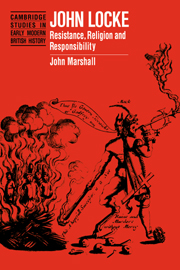
-
Select format
-
- Publisher:
- Cambridge University Press
- Publication date:
- January 2010
- August 1994
- ISBN:
- 9780511598531
- 9780521466875
- Dimensions:
- Weight & Pages:
- Dimensions:
- (228 x 152 mm)
- Weight & Pages:
- 0.723kg, 512 Pages
You may already have access via personal or institutional login
Book description
This book provides a contextual account of the development of John Locke's political, religious, social and moral thought. It analyses many of Locke's unpublished manuscripts and relatively neglected works as well as the Two Treatises, the Letter Concerning Toleration and the Essay Concerning Human Understanding. Professor Marshall studies the development of Locke's political thought from absolutism to resistance, and provides significant revisions to current explanations of the immediate contexts and purposes of composition of the Two Treatises. He also sets out major accounts of Locke's moral, social and religious thought both as extremely important subjects in their own right and in order to challenge many scholars' interpretations of their influences on Locke's political thought.
Reviews
"John Marshall's sophisticated new intellectual biography, which draws on unpublished manuscripts and relatively neglected works as well as Locke's better known writings, goes a long way toward making sense of this brilliant but complex thinker. Rather than search for a deeper, underlying consistency in Locke's thought, Marshall explores how Locke came to change his mind so dramatically over the course of his life in response to changing political circumstances, new personal contacts, and (perhaps above all) through his own process of intellectual inquiry....This is an impressive book." Tim Harris, Brown University, Journal of Modern History
"...[an] erudite, carefully developed study....this is an important work in the history of social, political, and philosophical thought." Journal of Church and State
"Anyone interested in the relation of theology to the founding father of American liberalism will find this volume essential reading." Theological Studies
"...at once textually acute and theoretically grand....[a] superb and detailed study..." The Review of Politics
"...this study is an impressive scholarly achievement and a major contribution to the understanding of Locke's moral and religious thought." Julian H. Franklin, American Historical Review
"This is a very good book. It presents the historical context in which Locke's doctrine emerged clearly and intelligently....It is also the most careful and comprehensive treatment of Locke's political theology I have read." Edward G. Andrew, Albion
Contents
Metrics
Full text views
Full text views help Loading metrics...
Loading metrics...
* Views captured on Cambridge Core between #date#. This data will be updated every 24 hours.
Usage data cannot currently be displayed.
Accessibility standard: Unknown
Why this information is here
This section outlines the accessibility features of this content - including support for screen readers, full keyboard navigation and high-contrast display options. This may not be relevant for you.
Accessibility Information
Accessibility compliance for the PDF of this book is currently unknown and may be updated in the future.


